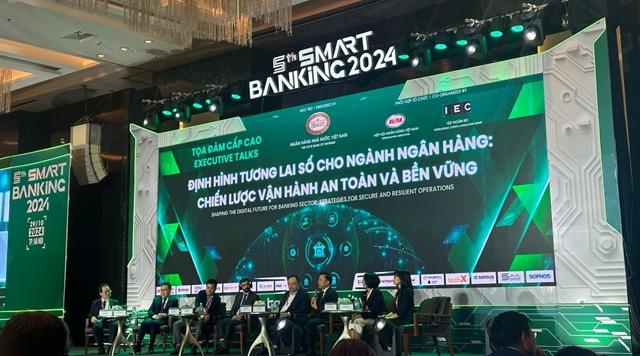In 2024, smart banking development has evolved beyond mere technological trends, transforming into a sustainable development strategy that promotes experience sharing and mutual learning among banks.
At yesterday’s 2024 Smart Banking Conference and Exhibition in Hanoi, State Bank of Vietnam Deputy Governor Pham Tien Dung delivered an opening speech titled “Shaping the Digital Future of Banking: Security and Resilient Operation Strategy.” He emphasized that the banking sector benefits from an open legal framework for digital advancement, making its achievements particularly notable among various industries.
Since 2021, the State Bank of Vietnam has pioneered electronic identity authentication for account opening services, and from October 1, 2024, allowed account opening using chip-embedded citizen ID cards, enabling fully online guarantee and loan services. These legal foundations provide crucial support for technology integration in the banking sector.
Vietnam Banks Association Vice Chairman and General Secretary Nguyen Quoc Hung noted that digital transformation in global and Vietnamese banking is at a crucial stage. Innovative technologies including big data, AI, machine learning, augmented reality, and open banking platforms are driving this transformation, making smart banking the cornerstone of sustainable tech-banking development.
The banking sector has made significant progress in digital transformation, driven by IT development strategies, digital transformation plans, and legal frameworks including the 2024 Credit Institutions Law and Non-cash Payment Decree. Electronic banking service quality and convenience have notably improved, with credit institutions achieving banking operation modernization through key technologies, particularly in management, data analysis, and customer service, providing 24/7 seamless services.
Data shows that some banks process over 90% of transactions through digital channels, and over 80% of Vietnamese adults have payment accounts. The credit institution system has accumulated about 200 million customer records, including 46.7 million biometric verification accounts. Financial exchange and clearing systems process over 20 million transactions daily, with interbank electronic payment systems handling over 830 trillion VND (approximately $32.5 billion) daily, growing at 23.5% annually.

Deputy Governor Pham Tien Dung stated that many commercial banks achieve 97-98% digital channel transaction rates, maintaining double-digit growth in both transaction volume and value. However, security and operational continuity risks increase as banks deepen interconnection with external systems such as public security and telecommunications.
Nguyen Quoc Hung emphasized that the banking sector faces increasing security threats and information leakage risks. The rise in Advanced Persistent Threats (APTs) and customer fraud cases by organized crime groups poses significant challenges to banks’ digital transformation.
Chen Min Ju, President (Digital) of ST Engineering Enterprise Singapore, shared her views on banking information security, emphasizing that data protection and resilience must follow three fundamental principles: encryption, integrity, and availability. The company has launched advanced cybersecurity solutions including WizKnight Cloud and SCALE to protect remote user communications and enhance virtual desktop security. These solutions strengthen secure remote access and connectivity capabilities for both local and cloud platforms, ensuring data confidentiality, integrity, and availability.
She emphasized that continuous monitoring of threats and vulnerabilities in banking infrastructure, along with effective employee training, is crucial for enhancing security. They provide advanced solutions including supply chain cybersecurity monitoring, cloud investigation, and response automation to help banks respond more quickly to cyber threats and achieve more effective risk management.
Overall, smart banking development has evolved from purely pursuing technological innovation to becoming a comprehensive strategy focused on industry sustainable development. While advancing digital transformation, the banking sector needs to continuously strengthen security measures, balance innovation with risk, and build a secure and reliable smart banking system.







